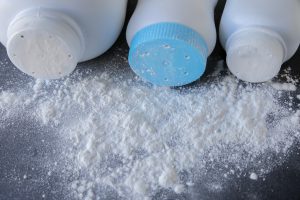Talcum powder use has also been linked to: fallopian tube cancer, borderline serous tumors, borderline mucinous tumors, and mesothelioma. It has been shown, through litigation, that the makers of popular talc-based products have been aware of the potential links to cancer but failed to warn users.
Talcum powder is derived from a mineral, talc, which is popular for its moisture absorbing and friction-reducing abilities. In its natural state, talc sometimes contains asbestos. Asbestos is a known cause of cancer. Talc is believed to cause cancer by provoking chronic inflammation in the fallopian tubes, uterus, and ovaries and possibly suppressing cancer-fighting antibodies. When used in the genital area, talcum powder can travel up to the reproductive organs.
Due to scrutiny from the United States Congress, and a criminal investigation of Johnson & Johnson, the Food and Drug Administration (FDA) commissioned tests in 2019 and found asbestos in 11 of their talc-based cosmetics, including Johnson & Johnson Baby Powder. Johnson & Johnson recalled 33,000 bottles of the powder.
There have been several successful cases brought against Johnson & Johnson and OMJ Pharmaceuticals, Inc. for their popular talc-based baby powder that have resulted multi-million-dollar verdicts and settlements. Recently, Johnson & Johnson settled 1,000 Talc Lawsuits (out of approximately 20,000) for $100 million. The product was finally removed from the market in the United States in May 2020. [1]
The statute of limitations varies depending on the state, but in Delaware, an injured party has two years to file a complaint in court, from the date the party or her family discovered the link between talc and the injury or death. The lawsuits seek compensation for injury, pain and suffering, emotional distress, loss of earnings, medical expenses, and wrongful death, if applicable.
Plaintiffs may also seek punitive damages, which are designed to punish a manufacturer for marketing and selling a product known to be dangerous or defective. Internal documents from J & J show that the company knew about the danger from at least 1971. [2]
[1] http://www.cnbc.com/2020/05/19/johnson-johnson-discontinues-talc-based-baby-powder-in-us-and-canada.html
[2] http://www.reuters.com/investigates/special-report/johnsonandjohnson-cancer/
(302) 652-2050.















